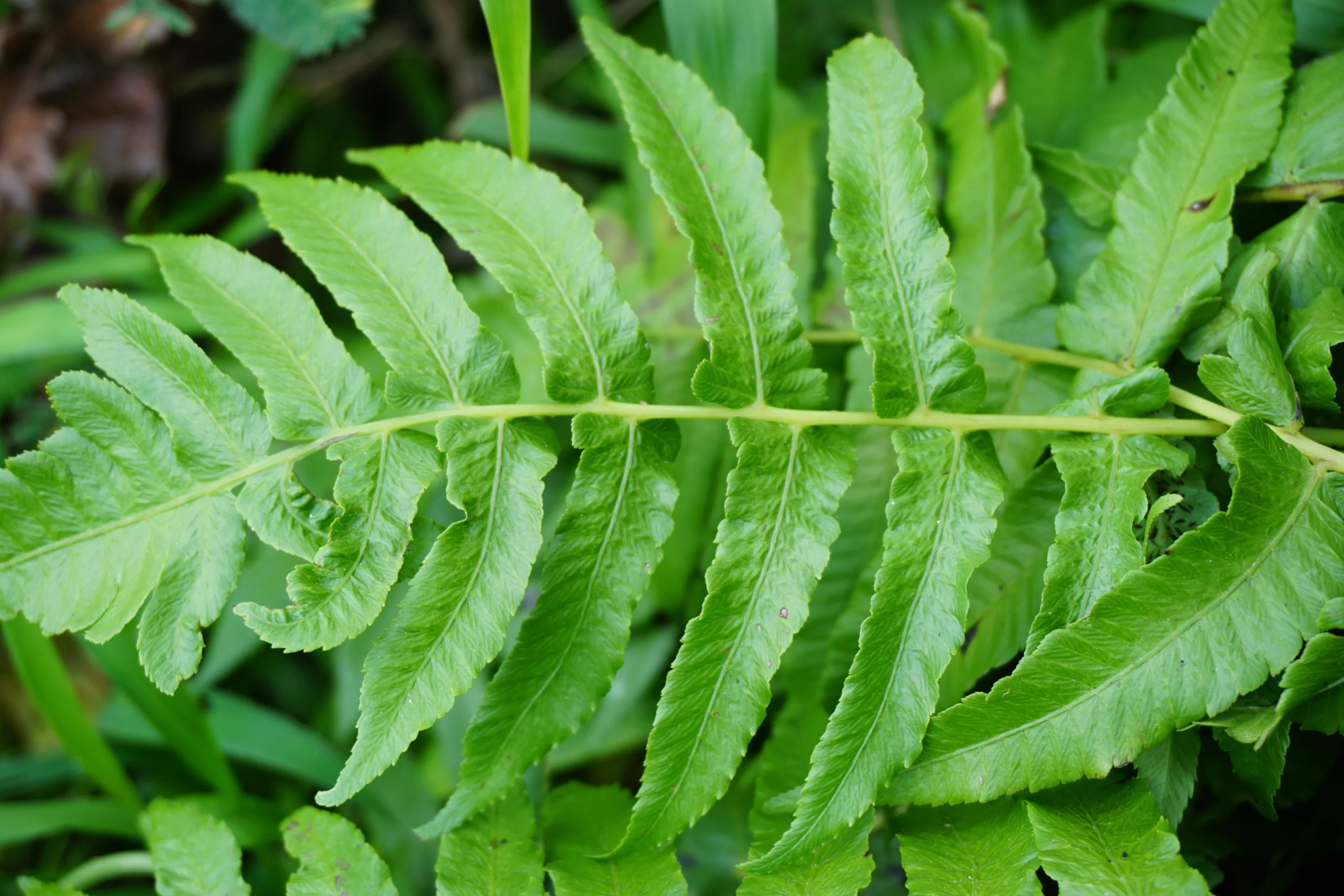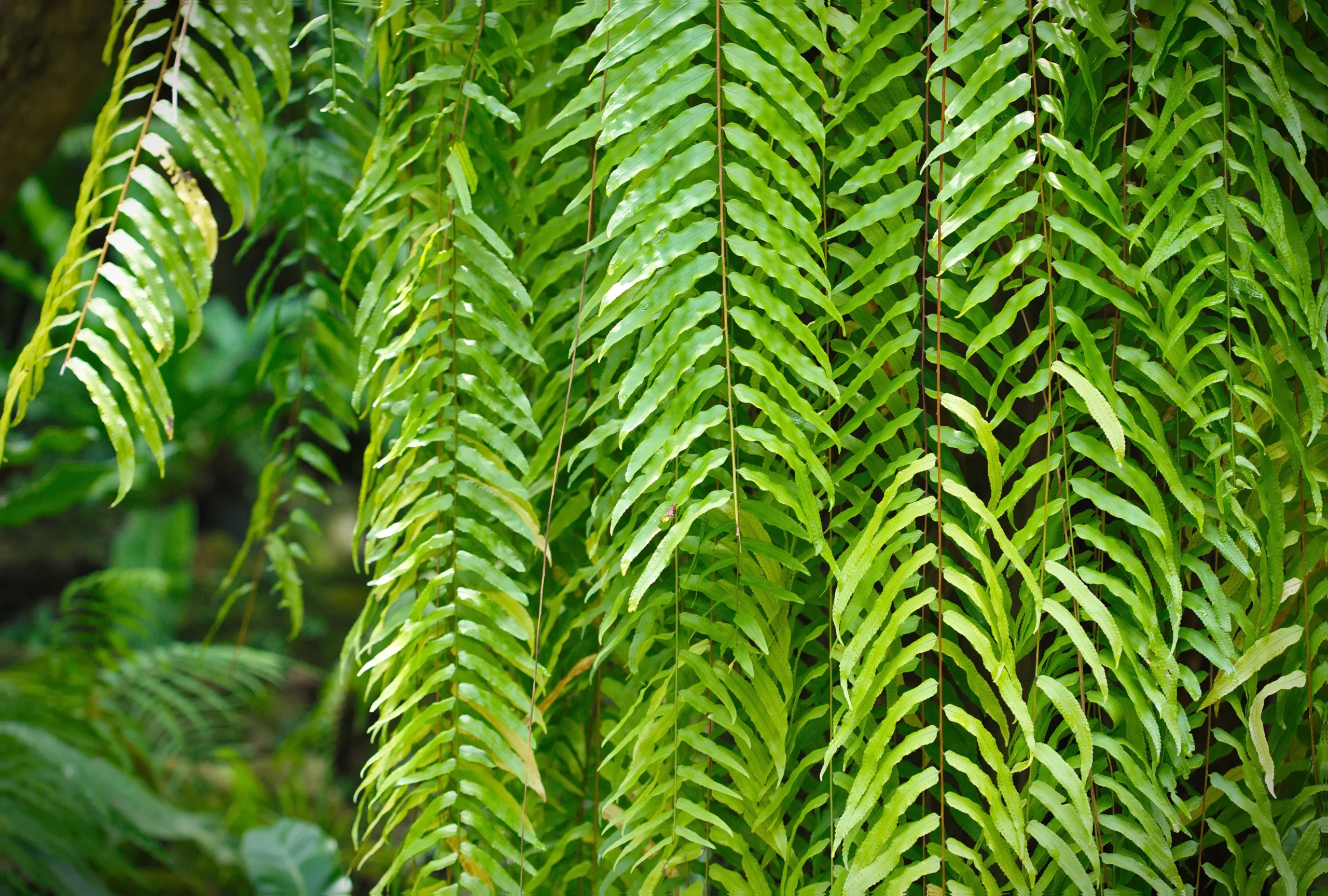Family: Fern
Type: Annual

The Macho Fern, known scientifically as Nephrolepis biserrata, stands out in the fern family for its robust size and striking, lush green fronds. This vigorous plant can spread widely and grow fronds up to 4 feet in length, making a bold statement in any garden setting. Its hardy nature and ease of care have made it a popular choice among gardeners seeking to add a tropical flair to their landscapes.
Thriving in partial to full shade, the Macho Fern prefers moist, well-drained soil, making it an ideal plant for shaded garden areas where other plants might struggle. Despite its tropical appearance, it is relatively tolerant of less humid conditions, making it adaptable to a variety of indoor and outdoor environments. Its voluminous growth habit and the dense coverage it provides have also made it a favorite for creating natural privacy screens or lush green backdrops.
In addition to its aesthetic appeal, the Macho Fern serves as an excellent air purifier, making it a beneficial addition to both home and garden. Whether used in large containers, hanging baskets, or directly in the ground, it brings vitality and a sense of lushness, transforming spaces into verdant sanctuaries with minimal effort.
Hardiness Zone: 10a-11b
Pet Friendly: Yes
Moisture Preference: Average to moist
Sun Needs: Full sun to shade
Growth Rate: Fast
Average Height (feet): 5
Average Spread (feet): 6
Average Life Span (years): 20
Form: Arching
Foliage Color: Green
Foliage Shape: Ferny
Incorporating Macho Fern into your landscape design can significantly enhance the garden’s texture and depth. Its expansive fronds add a dramatic touch to shaded garden corners, making them feel instantly more vibrant and filled with life. By planting Macho Ferns along walkways or garden edges, you can create a soft, feathery boundary that adds movement and interest to the garden layout.
Macho Ferns are exceptionally versatile in garden design, blending well with both tropical and traditional garden themes. Their lush appearance complements flowering plants by providing a continuous green backdrop that accentuates seasonal colors. This fern is particularly effective in shade gardens, where its ability to thrive in lower light conditions can be fully utilized to bring beauty to underutilized spaces.
For those interested in container gardening, Macho Ferns make a stunning choice. When potted, they become mobile green sculptures that can decorate patios, balconies, or indoor spaces. Grouping several Macho Ferns together in containers can create an instant tropical oasis, even in temperate climates, offering a retreat from the hustle and bustle of daily life.

Macho Fern is a staple in tropical garden designs, contributing to the lush, dense look characteristic of these paradisiacal landscapes.
In woodland gardens, Macho Fern blends seamlessly with the natural environment, enhancing the forest floor with its voluminous growth and vibrant green fronds.
For contemporary gardens, Macho Fern offers a contrast in texture and form, providing a soft counterpoint to hard landscaping elements and minimalist design approaches.
Create an under-tree fern garden by planting Macho Ferns beneath large trees. Their shade tolerance and large fronds fill the space with greenery, mimicking a natural forest undergrowth.
Use Macho Ferns to line shaded garden paths, providing a lush, inviting walkway that draws visitors deeper into the garden with its cascading fronds.
Incorporate Macho Ferns into a living wall or vertical garden structure in shaded areas. Their dramatic fronds add depth and dimension, creating a living tapestry that captivates and delights.
Select our pre-made garden layouts to create a landscape that’s uniquely yours. Simple, smart, and customizable!
In spring, Macho Ferns begin to unfurl their new fronds, signaling the start of the growing season with fresh, vibrant growth.
During summer, the Macho Fern reaches its full glory, with dense, lush fronds creating a cool, tropical feel in the garden.
As fall approaches, Macho Ferns maintain their green vibrancy, offering a lasting touch of lushness even as other plants begin to fade.
In winter, Macho Ferns in colder climates may need protection or to be brought indoors, where they continue to purify the air and add greenery to indoor spaces.
Trachycarpus fortunei
Hibiscus syriacus 'Notwoodthree'
Rosmarinus officinalis Tuscan Blue
Macho Ferns excel in shady to partially shady spots in the garden, where direct sunlight is limited. They’re perfect for adding lushness to those darker garden areas that other plants might not tolerate.
Prefer partial to full shade, avoiding direct afternoon sun to prevent scorching their fronds.
They thrive in rich, well-draining soil with plenty of organic matter. Ensure the soil remains moist but not waterlogged.
Space Macho Ferns about 2 to 3 feet apart to give them room to spread and achieve their full, lush appearance.
The best time to plant Macho Ferns is in the spring, once the threat of frost has passed, to give them a full growing season to establish.
Dig a hole as deep as the root ball and twice as wide. Place the fern in the hole, backfill with soil, water thoroughly, and apply a layer of mulch to retain moisture.
Keep the soil consistently moist, especially during hot, dry periods. Macho Ferns require more water if grown in pots.
Apply a balanced liquid fertilizer monthly during the growing season to support lush, healthy growth.
Trim back any brown or damaged fronds to keep the plant looking tidy and to encourage new growth.
Resume regular watering and start monthly fertilization to kickstart growth.
Ensure adequate moisture during hot weather and continue monthly fertilization.
Reduce watering and stop fertilizing as the plant's growth slows down.
In colder regions, move potted Macho Ferns indoors or protect outdoor plants with mulch.
Dryopteris erythrosora 'Apple Court'
Athyrium Nippocum 'Pictum'
Polystichum munitum
In USDA zones 9-11, Macho Ferns can typically survive outdoors. In cooler zones, they should be brought indoors or provided with protection.
Regular pruning of old or damaged fronds and adequate fertilization can encourage a bushier appearance.
While generally pest-resistant, they can occasionally be affected by scale or spider mites, especially when grown indoors. Regularly check your fern and treat pests with insecticidal soap or neem oil as needed.
Sign up below to get exclusive deals, discounts, and new plant collections—delivered straight to your inbox! Plus, stay inspired with the latest gardening tips, landscaping trends, and DIY garden ideas. Start growing with us today!
A big thank you for subscribing to the PBN Design newsletter.
We're thrilled to have you join our community. Get ready for exciting updates, insightful content, and more delivered straight to your inbox.
Stay tuned!
Go backA big thank you for subscribing to the PBN Design newsletter.
We're thrilled to have you join our community. Get ready for exciting updates, insightful content, and more delivered straight to your inbox.
Stay tuned!
Go back